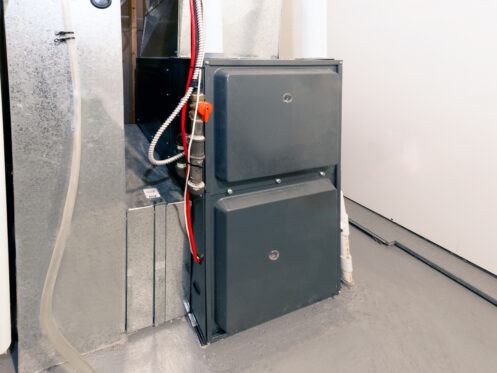Does your home in South Jersey use oil heating to provide warmth during the colder parts of the year? If so, have you considered the advantages of switching to natural gas heating? More and more households are realizing the benefits of natural gas heating systems.
These benefits include reducing your energy bill, helping the environment, and taking advantage of new technologies. You can use this guide on 11 reasons to make the switch to natural gas heating to help you decide whether it will benefit your home.
1. Cost Savings
Compared to oil-based heating systems, natural gas systems have the potential to significantly reduce heating costs. This is due to the lower per-unit pricing of natural gas when compared to oil. Natural gas heating systems also prove cost-effective, thanks to homeowners’ ability to have more control over their budgets due to the predictable cost of natural gas.
2. Improved Safety
Because of the composition of the fuel, natural gas heating systems are fundamentally safer than oil systems. Natural gas diffuses into the air in the case of a leak, reducing the likelihood of combustion or pollution. This safety element is very essential for lowering the risk of accidents and making sure that the interior environment is secure.
3. Year-Round Use
With a natural gas heating system, you can power your heating system and a host of other household appliances and systems all year round. Some of the most common household appliances that use this energy source are gas stoves, gas water heaters, gas dryers, and gas fireplaces.
The adaptability of this energy source guarantees dependable and constant heating, cooking, and more. On the other hand, oil systems usually serve only one purpose: heating during the colder months. This means you’ll get much more use out of a natural gas heating system. Its year-round functioning ensures continual comfort and convenience.
4. Greater Home Value
Incorporating a natural gas heating system into your property can do wonders for its resale value. Homebuyers are increasingly interested in properties heated by natural gas because of their efficiency, cheaper running costs, and reduced environmental effects. Natural gas has the ability to adapt to a wide range of domestic applications, such as cooking and water heating.
These systems are not only more reliable than oil ones; they’re safer, cleaner, and usually have predictable running costs. The increased perceived value that comes from all of these characteristics makes natural gas-heated homes more desirable in today’s real estate market.
5. Less Maintenance
To maintain the effectiveness and safety of natural gas heating systems, it is crucial to have expert inspections performed often and to change the filters occasionally. However, natural gas heating systems are especially attractive to homeowners because they usually require less maintenance compared to oil systems.
Checking and cleaning components, as well as making sure heat exchangers and burners are working properly, are common maintenance tasks for natural gas systems. Because these systems also tend to have fewer components, maintenance is easier.
6. Fewer Emissions
Heating systems that use natural gas instead of oil as a heating source tend to produce far less pollution when compared to oil systems. This not only improves indoor air quality but also helps a home have a smaller carbon footprint. Reducing a home’s carbon footprint is essential to combating climate change and achieving a sustainable lifestyle.
7. Automatic Delivery
The size and efficiency of a tank, as well as household demand, influence how often to refill an oil heating system. Some homes have to refill oil tanks every few weeks to keep up with their heating demands. Fortunately, natural gas heating takes this hassle away. This is because natural gas systems connect directly to a natural gas supply line located on the property. As a result, homeowners have continuous access to heating, cooking, and hot water without ever having to worry about running out of fuel.
8. Quieter Operation
The combustion process and the functioning of burners and pumps can make certain oil heating systems rather noisy. In many cases, the ignition process and the forced-air supply mechanism are to blame for the loudness. On the other hand, the combustion of natural gas is usually not as loud. Hence, natural gas heating systems are typically quieter, making your home more peaceful.
9. Odorless
Oil heating systems can produce all kinds of unpleasant smells. Due to the sulfur in the oil, homeowners might smell an odor reminiscent of rotten eggs. Condensation in the system can cause a musty or moldy odor. A faulty combustion process can result in a sooty or smoky odor. On the upside, natural gas heating systems not only provide a cleaner and more effective form of heating when compared to oil systems, but they also produce fewer odors.
If you ever notice a weird smell coming from the heating system, it’s best to turn the unit off and contact a licensed HVAC technician right away. Certain odors can indicate major problems with the heating system and can even be detrimental to your health.
10. Smart Home Integration
Integrating natural gas heating systems with smart home automation is a breeze, allowing homeowners to operate and monitor their systems remotely using devices like smart thermostats. Using a smartphone or voice commands, users of smart thermostats can change the temperature, plan heating cycles, and get insights into energy use from any location. Achieving this degree of automation and control improves energy efficiency, lowers utility bills, and guarantees maximum comfort. Oil heating systems, unfortunately, don’t have access to these benefits since they usually don’t support smart integration.
11. Space Efficiency
Because an oil storage tank is not necessary with a natural gas heating system, the latter takes up much less room than the former. This is especially helpful for residences in urban areas or those with smaller dwellings that have extreme space constraints because homeowners have more leeway to maximize their living areas.
How to Switch to Natural Gas Heating?
There are several crucial steps involved in switching from an oil-powered heating system to one that runs on natural gas. The first step involves contacting a licensed HVAC technician to look at your present setup. They will give you a rundown on whether a conversion is feasible. The technician can also tell you how to obtain any necessary permits or approvals that you need from local authorities, as well as how to properly dispose of any oil tanks.
Depending on the setup, your local gas company may have to install or modify a gas line on your property. Once the new system is set up, a technician will perform a comprehensive system check to ensure safety and efficiency, followed by calibrating the home’s thermostats.
Laury Heating Cooling & Plumbing is your go-to HVAC company in South Jersey. We offer a wide range of heating, cooling, and plumbing services, including natural gas conversions, ductless AC installations, water pipe repair, and sewer line maintenance. Contact us today to learn more about the benefits of switching from oil heating to natural gas heating.



